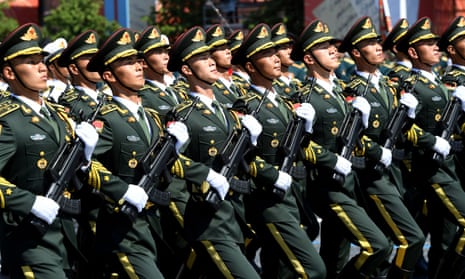China has rejected as a “concoction of lies” an incendiary article by the US’s most senior intelligence official, who labelled China the biggest threat to democracy and freedom since the second world war.
In a Wall Street Journal column, John Ratcliffe, the US director of national intelligence, said China was bent on world domination and the US needed to prepare for an “open-ended period of confrontation”.
While intelligence agencies had historically prioritised concerns over Russia and counter-terrorism, China should be the primary national security focus of the US, he warned, and it posed “the greatest threat to America today, and the greatest threat to democracy and freedom worldwide since world war two”.
Ratcliffe said China was “regularly” directing influence operations on US soil, and had targeted members of Congress at a frequency six times that of Russia, and 12 times that of Iran. He also accused China of stealing US technology to fuel Xi Jinping’s huge modernisation of the People’s Liberation Army.
At a regular press briefing on Friday, China’s foreign affairs spokeswoman, Hua Chunying, said the article was “just a sensational headline” and did not show any real evidence. “He just continued and repeated what is I think another concoction of lies,” she said.
“We hope that American politicians will respect the facts, stop making and selling fake news, stop fabricating and spreading political viruses and lies, and stop damaging Sino-US relations, otherwise it will only further damage the credibility of the United States.”
Earlier, a spokesperson for the Chinese embassy in the US told Reuters that Ratcliffe’s comments were “fact-distorting” and hypocritical, and showed “the entrenched cold war mindset and ideological prejudices of some people on the US side”.
Ratcliffe had accused Beijing of intending to “dominate the US and the rest of the planet economically, militarily and technologically”, through an economic espionage approach he termed “rob, replicate and replace”.
“China robs US companies of their intellectual property, replicates the technology, and then replaces the US firms in the global marketplace,” he said.
Ratcliffe also aired claims, including that China has conducted human testing on PLA personnel “in hope of developing soldiers with biologically enhanced capabilities”, without giving further details.
In the opinion piece, Ratcliffe said the world was being presented with a choice between “two wholly incompatible ideologies”.
“We shouldn’t assume that Beijing’s efforts to drag the world back into the dark will fail just because the forces of good have triumphed before in modern times. China believes that a global order without it at the top is a historical aberration. It aims to change that and reverse the spread of liberty around the world.”
The opinion piece by Ratcliffe, a former Republican congressman in Texas appointed as head of the intelligence agencies in May, is the latest salvo in the ongoing US-China dispute, which China hopes will calm down once Joe Biden takes office in January.
Under Trump’s presidency the relationship has deteriorated to historic lows. While Trump initially praised the leadership of Xi Jinping, relations soon soured with the two governments sparring over trade, technology, and visas for journalists and diplomats. Trump began using increasingly anti-China rhetoric, and issued executive orders and sanctions against China across trade and over human rights issues including abuses in Xinjiang and the crackdown in Hong Kong. The US’s strengthening ties with Taiwan, including billions of dollars in arms sales, has also angered Beijing.
Until the inauguration of Biden, Trump retains the powers of the presidency and has used them to continue issuing executive orders and sanctions on Beijing, including banning US investment in a growing list of companies determined to be connected to China’s military. During the last week alone, the US passed a law to expel Chinese companies from its stock exchanges for noncompliance with auditing rules, cut the maximum validity of visas for Chinese Communist party members from 10 years to one month, and banned cotton imports from a leading organisation in Xinjiang.
US analysts suggested Trump’s series of final strikes against Beijing was seeking to cement a legacy as the president who was tough on China, while simultaneously making things difficult for his successor.
Earlier this week, Biden said his China policy would focus on building alliances to tackle China’s “abusive [trade] policies”.
In response, an editorial in the state-backed Global Times said Biden’s plans would damage the economies of both nations, and warned the US – which has taken a far greater economic hit during the pandemic than China – could “not afford an ongoing trade war”. It joined comments by the Chinese ambassador to the US, Cui Tiankai, urging stabilisation of the relationship.
Additional reporting by Lillian Yang
